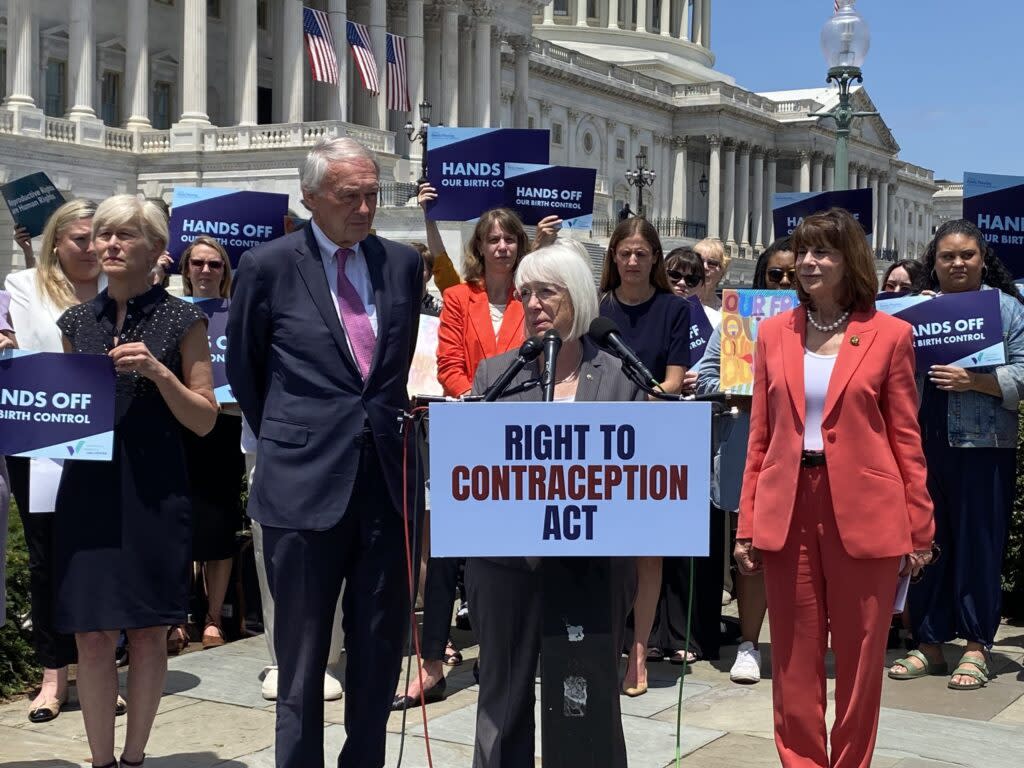Ohio’s congressional Dems demand vote on contraception protection

- Oops!Something went wrong.Please try again later.
- Oops!Something went wrong.Please try again later.
- Oops!Something went wrong.Please try again later.
Massachusetts Democratic Sen. Ed Markey, left, Washington Democratic Sen. Patty Murray, center, and North Carolina Democratic Rep. Kathy Manning at a press conference on contraception access outside the U.S. Capitol on Wednesday, June 14, 2023. (Photo by Jennifer Shutt/States Newsroom)
Democrats from Ohio’s U.S. Congressional delegation want the right to contraception codified into federal law, an effort that’s now in its third attempt on Capitol Hill.
U.S. Reps. Joyce Beatty, Emilia Sykes, and Greg Landsman met on a Tuesday press call to talk about the measure, and to demand a vote from the Republican majority.
“It is our job as lawmakers to uphold the will of the people we serve and codify the right to contraceptive access to everyone, no matter what their ZIP code is, or who their governor or their legislature might be,” Sykes said.
The proposed “Right to Contraception Act” was originally created in response to comments made amid the U.S. Supreme Court’s decision in Dobbs, which overturned Roe v. Wade and the national legalization of abortion.
“We’re concerned because we know post-Dobbs, voters are concerned about their right to contraceptives and the threat that the Supreme Court will overturn the constitutional right to contraception,” Beatty said.
In supporting the ruling overturning Roe v. Wade, U.S. Supreme Court Justice Clarence Thomas mentioned another case, Griswold v. Connecticut, which in 1964 overturned an 1800s-era law that banned contraception, specifically when it came to marriages. In that case, the nation’s highest court said couples had a right to privacy that kept states from banning contraception in marriages.
Thomas, however, used his concurrence in the Dobbs case to ponder reconsideration of cases like Griswold. He wondered if, after overruling “demonstrably erroneous decisions” like the one in Roe v. Wade, “the question would remain whether other constitutional provisions guarantee the myriad rights that our substantive due process cases have generated.”
Following the comments, U.S. House members introduced a bill to codify birth control access, and it saw success in that chamber still under Democratic control in 2022, but did not fare well in the U.S. Senate where it was blocked by Republican U.S. Sen. Joni Ernst.
In the House, all but two of Ohio’s Republican U.S. representatives voted against the bill, with Rep. Bob Gibbs attending the session but not voting for or against it. Then-U.S. Rep. Anthony Gonzalez stood as the lone Republican “yes” vote from the state of Ohio.
Another bill to create statutory protections for contraception on the federal level was introduced in the U.S. House in June 2023, but never went further.
Now, Ohio congressional Democrats are bolstered by the success of the state’s Issue 1, for which 57% of voters approved reproductive rights protections in the Ohio Constitution last November.
“It’s on us to, not just to reintroduce this legislation, but again … to push very, very hard to ensure that we get it done and it becomes the law of the land,” Landsman said.
Discussion of this legislation is especially appropriate following the Mother’s Day weekend and in a time when Republicans are trying to “mandate motherhood,” according to Sykes.
“Being a mother is one of the toughest, most thankless jobs in the world, and there is simply no better way to honor our mothers or those who want to become mothers by protecting their freedom to choose if, when they start to expand their family,” she said.
Beatty said sponsors are just starting the process of introducing the bill, and though they don’t have any Republican members signed on yet, they have a “close margin on the House side,” as well as the support of Democratic Ohio U.S. Sen. Sherrod Brown in pushing a Senate version of the bill.
Eight Republicans voted in favor of the 2022 version of the contraception bill, and Beatty said sponsors plan to start with those members of the GOP as they look to move the bill forward.
Now-U.S. House Speaker Mike Johnson, R-Louisiana, voted against the bill in 2022.
The three Ohio representatives said the issue should not be seen as a partisan one, because contraception use impacts all Americans. They also said the issue of whether or not they have Republican support is something to which the representatives of that party should have to answer.
“That question is better served for our colleagues who have chosen not to sign on, and why they won’t stand with us and help protect these very fundamental rights of all our constituents,” Sykes said.
GET THE MORNING HEADLINES DELIVERED TO YOUR INBOX SUPPORT NEWS YOU TRUST.
The post Ohio’s congressional Dems demand vote on contraception protection appeared first on Ohio Capital Journal.

